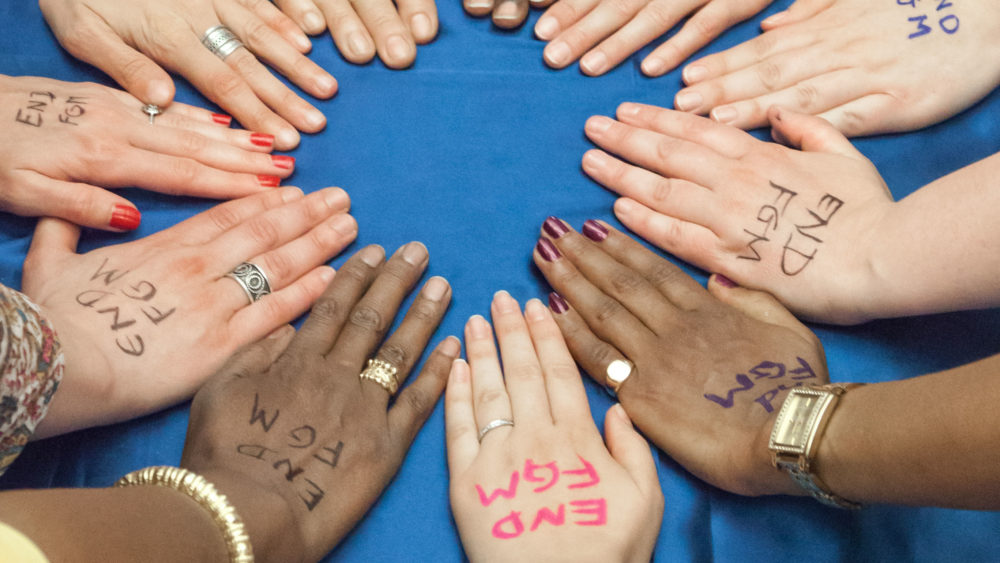Every year, 6 February marks the day for a world-wide outcry to stop, once and for all, the practice of female genital mutilation (FGM). Violence against women is an all too well documented form of societal and political oppression, and the practice of FGM on young girls and women has to be one of the most horrific and oppressive forms of gender violence. We as the Task Force for Feminism, Disability and Diversity, ask world leaders and communities to show zero tolerance for FGM every day of the year.
The practice of FGM is an expression of deeply entrenched gender inequalities, borne from a lethal cocktail of cultural, religious, political and social structures upon which are built patriarchal families, communities and entire societies that rely on the “relation of gender based on inequality”. Historically, the female body has been the playground for entire societies and cultures to establish hierarchies and property on life based on sexism, misogyny and the appropriation of bodies for economic and social prerogatives. A true obeissance to a masculine mandate that through genital mutilation finds its most truculent form of establishment of power over the female body and its designation within the hierarchies of production and reproduction of systems of life: a hierarchy that can only be established and maintained through the expression of power as dominant and brutal violence.
As Rita Laura Segato states: “Masculinity rules by means of a primal and permanent pedagogy. It teaches the expropriation of value and consequent domination.”
FGM is not merely maintained by these inequalities, but gender inequalities are indeed sustained by the practice of FGM. The practice maintains power structures based on gender in a society where women and their ‘honour’ are considered as the objects and properties of men and therefore valued according to patriarchal necessities.
Nowadays, the majority of FGM is practiced in countries of Sub-Saharan Africa and the Middle East and Northern Africa, but it can also be found in Russia and South America and Asia. While many Europeans point the finger quickly at communities from these countries alone as those practicing it in Europe, it should not be forgotten that clitoridectomies (the partial or full removal of the clitoris) were practices in Western Europe (and the USA) as recent as the 1950s, treating perceived ailments such as hysteria, epilepsy, mental disorders or melancholia.
As Laura Hood writes that “in 1860s London, one form of FGM — clitoridectomy, the surgical removal of the clitoris — briefly became an acceptable treatment for a wide range of conditions including “hysteria” and mental illness. It could also be used as treatment for behaviour seen as unfeminine and as a threat to marriage. These included a “distaste for marital intercourse”, “a great distaste for her husband”, violent behaviour, or even just answering back.”
FGM is not exclusive to low-income countries as there are reports of medically done clitoridectomies in Russia as late as 2018.
In Egypt, “Nearly 90% of Egyptian women and girls aged between 15 and 49 have undergone FGM, according to a 2016 survey by the U.N. Children’s Fund (UNICEF), and the ritual is practised widely by both Muslims and Christians despite the 2008 ban”, but no one has ever been convicted under the law, which was just strengthened again (with harsher sentencing in January 2021).
FGM does not only violate a myriad of children’s and human rights, such as Article 2, 12, 19(1), 24 and 37 of the UN Convention on the Rights of the Child, it also impacts on the right to dignity and is directly in conflict with the right to physical integrity as it involves the mutilation of healthy body parts.
Circling back to the beginning, there is a total absence of medical or clinical justifications for any form of FGM! It is time we took our bodies back from the patriarchal gaze and its oppressive and destructive demands. But here we are, asking for all of you to speak up about and against it, demand change and hold people accountable.
Approximately 6000 girls are subjected to FGM every day, time to act.
#EndFGM
Volete essere informati delle azioni di DiEM25? Registratevi qui!




